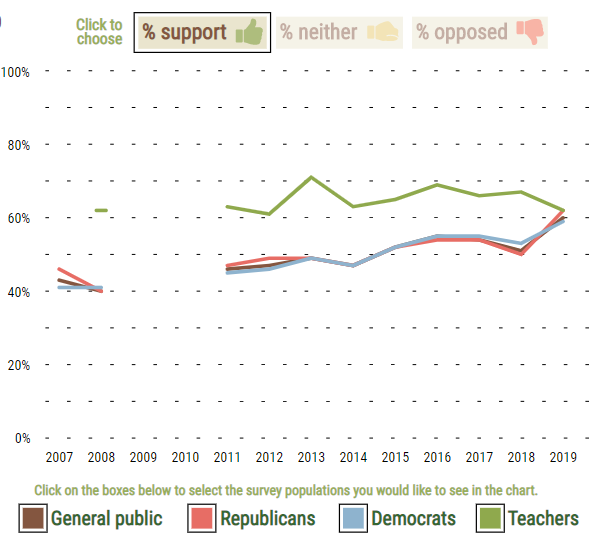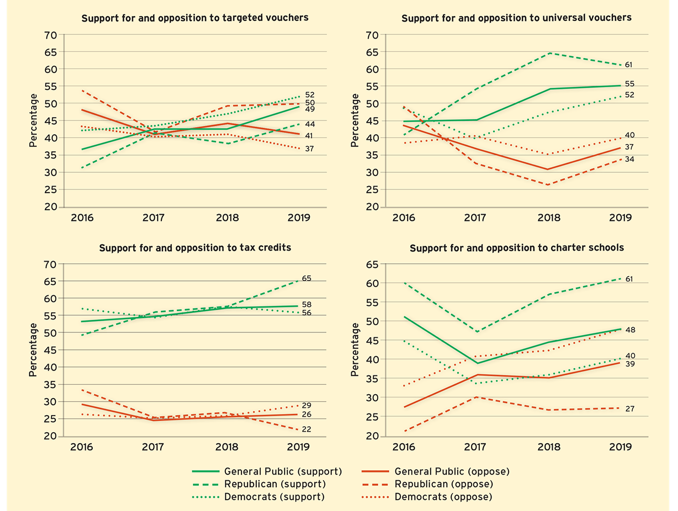 Editor’s note: On Wednesday, redefinED reported on one aspect of Education Next’s latest survey of public opinion – the extent to which the public underestimates the amount of money spent on K-12 education. We continue exploring the survey today, reviewing responses related to questions about vouchers, tax credits and charter schools.
Editor’s note: On Wednesday, redefinED reported on one aspect of Education Next’s latest survey of public opinion – the extent to which the public underestimates the amount of money spent on K-12 education. We continue exploring the survey today, reviewing responses related to questions about vouchers, tax credits and charter schools.
Methodology
This portion of the survey looked at trends in public opinion between 2016 and 2019 on four school choice policies: targeted vouchers limited to students from low-income families; universal vouchers for all families; tax credits for contributors to organizations that give scholarships to low-income families; and charter schools.
The upshot
The chart below shows growing support for school choice but indicates a partisan divide on charter schools.

Points worth noting
· The percentage of American adults favoring vouchers that help low-income students cover the cost of private-school tuition rose to 49 percent in 2019 from 37 percent in 2016, while support for tax credits for donations to organizations that give scholarships to low-income students edged upward to 58 percent from 53 percent.
· Both Republicans and Democrats support targeted and universal vouchers at higher levels in 2019 than in 2016, and scholarships funded by tax credits continue to command broad bipartisan support.
· The partisan divide has widened on support for charter schools, growing to 21 percentage points in 2019 from 15 percentage points in 2016.
A deeper dive
Targeted vouchers are the least popular of the four school choice programs according to the survey. Nevertheless, 49 percent of respondents said they favor vouchers for low-income families, with just 41 percent expressing disapproval, a 12 percentage-point gain over the past four years, with opposition declining by 7 percentage points.
Meanwhile, both Republicans and Democrats are more in favor of targeted vouchers than they were in 2016. Republican approval has jumped to 44 percent, a 13 percentage-point increase, while opposition has fallen to 50 percent, a 4 percentage-point decline. Democratic approval for low-income vouchers has climbed to 52 percent, a 10 percentage-point increase, with disapproval receding to 37 percent, a 6 percentage-point decline.
Universal voucher opinion among survey respondents follows a similar trend, with 55 percent in favor in 2019 compared with 45 percent in 2016. Republicans are more likely to back vouchers for all than vouchers reserved for low-income families, with approval among them rising to 61 percent. Among Democrats, approval of vouchers for all students has risen just slightly to 52 percent.
Tax credits for individual and corporate donations that pay for scholarships to help low-income parents send their children to private schools constituted the most popular of the school choice programs according to the survey. Overall, 58 percent of respondents favored tax credits, up from 53 percent in 2016. Among Republicans, 65 percent indicated approval, up from 49 percent in 2016. Among Democrats, 56 percent indicated approval, a number that has not changed significantly since 2016.
Finally, regarding charter schools, the EdNext survey indicates support has climbed back to 48 percent, the same level as in 2016. Disapproval, however, remains as high as it was in 2017 at 39 percent.
Meanwhile, the partisan divide in support for charter schools has widened to 20 percentage points. While Republicans appear as committed as ever to charter schools, with 61 percent in favor in 2019 compared to 60 percent in 2016, 40 percent of Democrats indicated approval in 2019, down from 45 percent in 2016.


